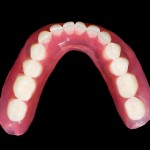
The replacement of missing teeth in edentulous patients has an impact on their quality of life. since the introduction of dental implants, the implant supported overdenture has become an alternative to the conventional denture. With many now considering that the implant supported overdenture should be the first choice of treatment.
The aim of this review was to assess patient satisfaction with mandibular implant overdentures compared to conventional dentures using the Oral Health Impact Profile (OHIP).
Methods
Searches were conducted in the Medline, the Cochrane Central Register of Clinical Trials (CENTRAL) and the Database of Abstracts of Reviews of Effects (DARE). Only randomised controlled trials (RCTs) where patients received implant retained mandibular overdenture or conventional mandibular denture opposing conventional maxillary complete denture with the main outcome of was change in quality of life measured with the Oral Health Impact Profile (OHIP) were considered.
Two reviewers independently screened the studies, abstracted data and assessed study quality using the Cochrane risk of bias tool. A random effects model was applied to measure the per cent mean difference in OHIP scale improvement between implant and conventional dentures.
Results
- 5 studies involving 442 patients (228 implant and 213 conventional) were included.
- None of the studies were at low risk of bias.
- Pooled analysis showed a statistically significant difference favouring the implant group for OHIP overall and all components except physical pain.
| Mean difference | 95% Confidence interval | |
| Total OHIP Score | –30.72 | –48.39, –13.05 |
| Functional limitation | –26.45 | –43.56, –9.35 |
| Physical pain | –29.16 | –60.89, 2.56 |
| Psychological discomfort | –77.61 | –154.63, –0.60 |
| Physical disability | –33.70 | –47.96, –19.44 |
| Psychological disability | –41.17 | –55.93, –26.40 |
| Social disability | –17.27 | –29.44, 5.10 |
| Handicap | –28.45 | –33.97, –22.92 |
Conclusions
The authors concluded
it is likely that implant supported overdentures perform better than conventional dentures in improving various domains of quality of life of edentulous patients. However, large robust randomized controlled studies with low risk of bias in both selection and ascertainment of outcome measures are required before reaching a final conclusion.
Comments
We recently looked at a broader review of this topic by Kodoma et al (Dental Elf – 13th Jan 2017). The current review has restricted itself to only those studies that used OHIP to compare patient related outcome. It has also searched a small range of databases. However, only 4 of the 5 studies included in this review were included in the Kodoma review. Both reviews find that implant overdentures provide a greater level of patient satisfaction that conventional dentures. Both reviews are also limited by the relatively small sample sizes and relatively short term follow up.
Links
Primary paper
Sivaramakrishnan G, Sridharan K. Comparison of implant supported mandibular overdentures and conventional dentures on quality of life: a systematic review and meta-analysis of randomized controlled studies. Aust Dent J. 2016 Dec;61(4):482-488. doi: 10.1111/adj.12416. PubMed PMID: 26836981.
Other references
Original review protocol on PROSPERO
Dental Elf – 13th Jan 2017
Mandibular implant overdentures: Impact on patient based outcomes.

[…] post Mandibular overdentures and impact on oral health appeared first on National Elf […]